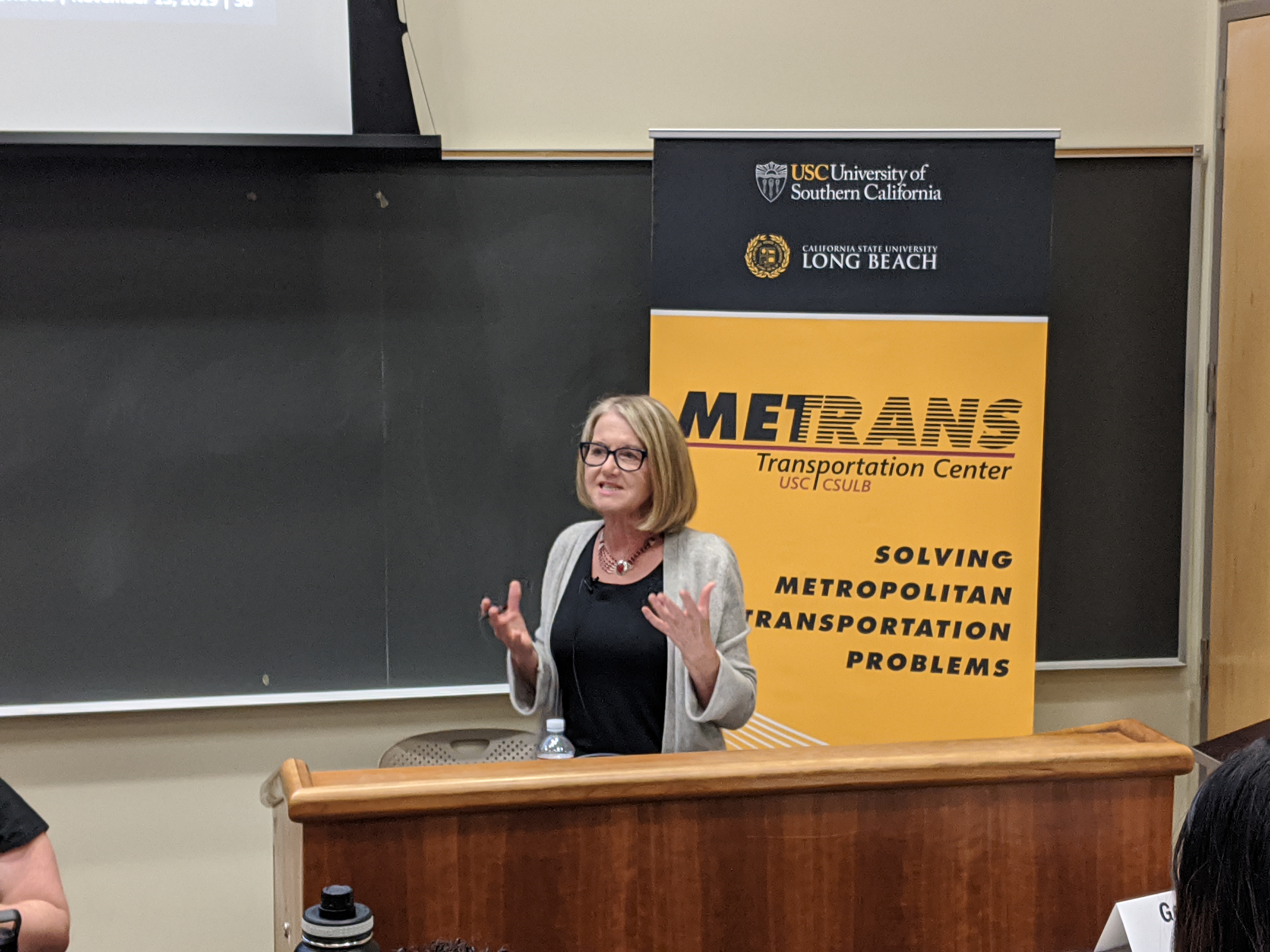News | METRANS Hosts Authors of New Report on Women's Travel Behavior
Stop the VideoNews

METRANS Hosts Authors of New Report on Women's Travel Behavior
Tuesday, February 11, 2020
by Ryan Hund, Master of Urban Planning (MUP), USC
On November 13, METRANS and PSR hosted four coauthors of a new report, commissioned by LA Metro, called Understanding How Women Travel to a standing room only audience at the USC Main Campus as part of the Fall 2019 Speaker Series. Participating in the discussion were Dr. Evelyn Blumenberg, Professor of Urban Planning, Director of the Lewis Center for Regional Policy Studies, UCLA Luskin School of Public Affairs, Department of Urban Planning; Judith McCourt, President, Redhill Group; Claudia Galicia, Senior Transportation Planner, Los Angeles County Metropolitan Transportation Authority (Metro); and Emily Finkel, Senior Transportation Planner, Fehr and Peers. The report they completed and shared details the results of a multi-year study into the travel behavior of female transit users in support of Metro’s effort to consider the gender-specific needs of riders in its network planning.
Metro’s Women & Girls Governing Council spearheaded the creation of this report to address a perceived lack of attention to the differing ways in which men and women moved through space. Galicia shared that this study was the first time any American transit agency had studied the behavior of female riders. The study focused on how Metro could improve conditions for women as an employer, a service provider, and as a catalyst for economic development. The overall goal of the study was to seek “not just one solution, but a comprehensive strategy to address the complex and inter-related causes of gender inequity, mobility and economic challenges” said Galicia.

Judith Mccourt, President at the Redhill Group
The next person to present on the topic was Dr. Blumenberg, Blumenberg noted that scholars had known about the differences in travel behavior between men and women for years, and that these differences stemmed primarily from the unequal division of unpaid labor in the typical American household. She also said that women’s choices of travel behavior and mode are influenced by both real and perceived safety and security concerns.
Finkel conducted the experimental parts of the study. She explained the data for the study was collected by observing the behavior and actions of transit riders in the field. Effort was made to ensure that samples were representative of Metro’s ridership both demographically and geographically. Fehr and Peers also conducted surveys, pop-ups at Metro stations, and workshops where participants were asked to envision a transit system that better served their needs.
After Finkel's presentation came Judith McCourt, President of Redhill Group, a market research firm that specializes in conducting focus groups. She explained that as part of the study, Metro sponsored three focus groups, two in English and one in Spanish, where riders reported in detail the benefits and difficulties of using Metro.
Galicia took the stage again to narrate some of the results of the study. Some of the highlights of the study include that:
- Women are more likely to be hypermobile (7+ trips) and immobile (0 trips)
- Their average trip rate is the same as men (3.5)
- Women 35-54 report the highest trip rate (4.1)
- Women are more likely to travel off-peak
- Women’s travel behavior peaks midday (2pm)
- Women are more likely to live in a car-free or car-light household
- Access needs are different for women and men due to women being more likely to have disabilities and to travel with others in their care
Galicia concluded the event by noting that Metro’s next steps would be to develop a Gender Action Plan and submit it to the Metro Board of Directors for approval and implementation.
The full report can be found here: https://thesource.metro.net/2019/09/19/metro-releases-understanding-how-women-travel-report/
News Archive
- December (1)
- November (6)
- October (4)
- September (2)
- August (3)
- July (4)
- June (3)
- May (7)
- April (8)
- March (11)
- February (8)
- January (7)
- December (7)
- November (8)
- October (11)
- September (11)
- August (4)
- July (10)
- June (9)
- May (2)
- April (12)
- March (8)
- February (7)
- January (11)
- December (11)
- November (5)
- October (16)
- September (7)
- August (5)
- July (13)
- June (5)
- May (5)
- April (7)
- March (5)
- February (3)
- January (4)
- December (4)
- November (5)
- October (5)
- September (4)
- August (4)
- July (6)
- June (8)
- May (4)
- April (6)
- March (6)
- February (7)
- January (7)
- December (8)
- November (8)
- October (8)
- September (15)
- August (5)
- July (6)
- June (7)
- May (5)
- April (8)
- March (7)
- February (10)
- January (12)















